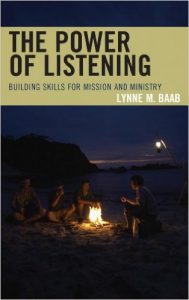Book Review of The Power of Listening: Building Skills for Mission and Ministry
by Lynne M. Baab, a monthly contributor to Godspace.
Reviewed by Sarah Sanderson
I’m not a natural-born listener. I’m definitely not one of those people who chose a vocation as a counsellor at age twelve because her friends were always confiding in her. No, I’m more of a natural-born interrupter. Start to tell me something important, and my tendency is to get so excited about whatever it is you’re talking about that I have to share my own thoughts, right away, right now, before you’ve even finished.
When I first tried to reform my ways, I thought that listening was simply the opposite of talking. Instead of jumping in and interrupting my friends, I would bite my tongue and concentrate on keeping my mouth shut. Remaining silent equals listening, right? Not if you’re so worried about not talking that you still can’t hear anything the other person says.
It turns out that listening is a much more complex and nuanced skill than simply putting a clamp on your tongue. Thankfully, God has graciously given me role models and road maps as I seek to grow in my listening capabilities. Lynne Baab’s book, The Power of Listening, offers both: the role models and the road map. Sharing quotes and examples from great listeners, as well as laying out a broad framework for how listening functions in many different settings, this book is a trustworthy guide. Baab has much to offer both for listening novices like me and for those lifelong listeners out there who seek to understand and apply their innate skills in new ways.
Listening requires not just staying quiet, but paying attention. In this fast-paced world of ours, we can become so overwhelmed that we stop paying attention to much of anything. The Power of Listening shows us how and why to bring our attention back into focus.
The book begins with a compelling true story: a missionary returned, after years of overseas service, to a declining congregation. By patiently listening for the latent passions buried deep in the hearts of the beleaguered church members, and then showing them how to listen to the needs of their community, the missionary helped to spark new enthusiasm, outreach, and growth. In this real-life example, listening was not confined to a single conversation, but became the bedrock of a months-, even years-long process of revitalization.
How can we learn to listen like that, in a way that matters, for our church, our community, and our world? What does it mean to listen to communication that is unspoken, such as creation, art, and even the architectural spaces and online messages around us? What role does posture play in prayer? What do we do with the anxiety that naturally arises within us as we listen to another’s pain? The Power of Listening raises and addresses question after question like this, ranging from the practical to the profound.
Baab gives particular primacy to the role of listening in churches. This book will be useful for clergy and lay leaders, as well as for church members. Each chapter offers questions at the end for use in small groups or personal reflection.
I first read The Power of Listening when it was released a couple of years ago. One story in particular stuck with me. Baab relates a time when she was recovering from surgery. She noticed that well-wishers often didn’t sit with the topic of her recovery process as long as she wished they would. Her experience as one who needed listening led to an insight: when talking with trauma survivors, it can be helpful to gently return to the topic of trauma again, even after the first “how are you” question has been lobbed and volleyed.
I used this concept just this morning. A friend told me how she was struggling with her mother’s advanced cancer. I listened, and prayed for her. The conversation continued on. But I sensed further sadness in my friend.
“I’m still feeling sad about your mom,” I offered. This kind of reflective empathy is one of the practical tools Baab offers in her book.
“I’m sad, too,” my friend replied, and she went on to give me new information that hadn’t come up in our first conversation. We continued on to have an even deeper time of prayer.
If The Power of Listening can help even a natural-born interrupter like me become a better listener, it’s a powerful book indeed.
(Sarah Sanderson is an MFA student at Seattle Pacific University, a pastor’s wife, and a mom of four. Her writing, on topics like faith, mental illness, parenting, and everyday life, can be found at confessionsofahumanmom.blogspot.com and www.sarahlsanderson.com.)


1 comment
[…] lots of great stories (and the stories shaped my book, The Power of Listening, reviewed here on Godspace.) I was quite surprised that most of my interviewees became most animated when they talked about […]